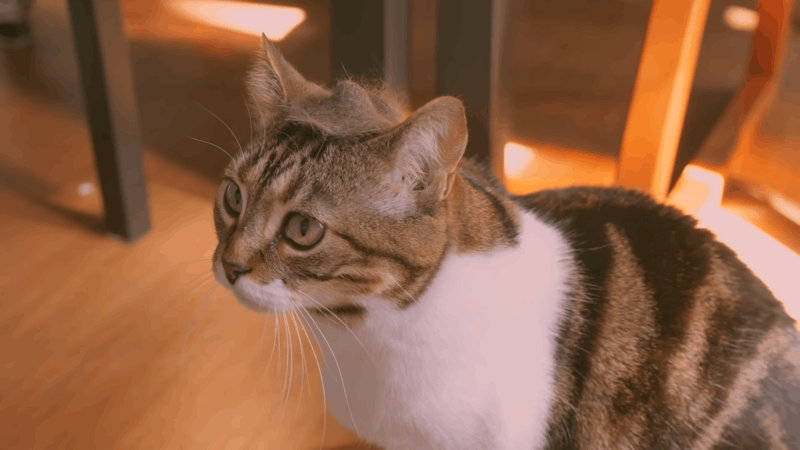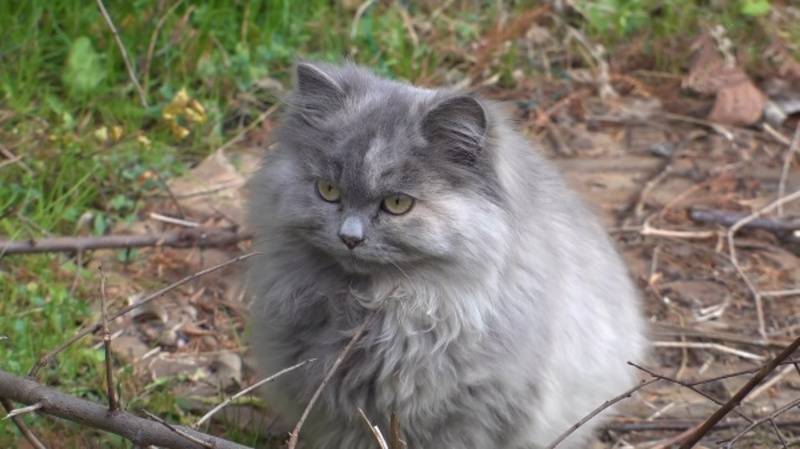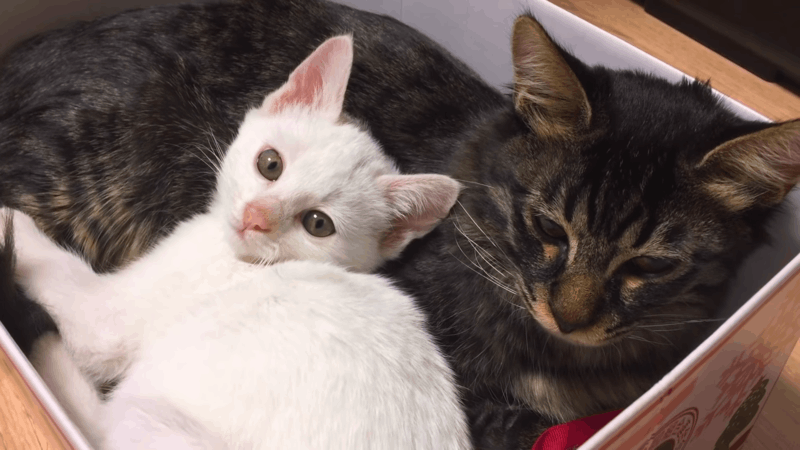No products in the cart.
CBD for sleep in cats has gained significant attention for its potential therapeutic properties, including its ability to promote better sleep. As cat parents, we understand the importance of our little friend’s well-being, especially when it comes to their sleep. In this blog, we will discover what is CBD for sleep in cats, how to get a cat to sleep at night, the relationship of CBD for pain relief and sleep in cats, recommended CBD products, and effective strategies to help your cat sleep better at night.
What Is CBD for Sleep in Cats?
CBD for sleep in cats refers to the use of cannabidiol, a natural compound derived from hemp plants, to promote better sleep quality and address sleep-related issues specifically in feline companions. CBD interacts with the endocannabinoid system to regulate various functions, including sleep.

The Potential Benefits of CBD for Sleep in Cats
CBD for sleep may offer several potential benefits for improving sleep in cats. It has been said to offer relaxing effects that can aid in lowering anxiety and encouraging relaxation, which can help with better sleep. Cats may experience more regular and peaceful sleep patterns thanks to CBD’s potential role in regulating the sleep-wake cycle.
How CBD Affects the Sleep-Wake Cycle in Felines
CBD impacts the sleep-wake pattern in cats by engaging with receptors in the endocannabinoid system, specifically CB1 and CB2 receptors, which are present in different body parts, including the brain. Through its interaction with these receptors, CBD has the ability to regulate multiple physiological functions, including sleep. Cats may have better sleep quality due to CBD’s ability to reduce anxiety and foster calm.
Precautions to Keep In Mind When Using CBD for Sleep in Cats
There are considerations and precautions to keep in mind when using CBD for sleep in cats. Here are a few important points:
- Consult with a veterinarian: Before starting your cat on CBD for sleep, it is crucial to consult with a veterinarian who is knowledgeable about CBD use in animals. They can provide guidance based on your cat’s specific needs and health conditions.
- Quality and dosage: Choose high-quality CBD products specifically formulated for cats. Ensure that the CBD products you use undergo third-party testing to verify their potency, purity, and safety. Follow the recommended dosage instructions provided by the manufacturer or as advised by your veterinarian.
- Start with a low dose: It’s advisable to start with a low dose of CBD for sleep and gradually increase it if necessary. Every cat may respond differently to CBD for sleep, so it’s important to monitor their response and adjust the dosage accordingly.
- Monitor for any adverse effects: Keep a close eye on your cat for any potential side effects or adverse reactions to CBD. While CBD for sleep is generally considered safe, some cats may experience drowsiness, changes in appetite, or gastrointestinal upset. If you notice any concerning symptoms, consult your veterinarian.
- Medication interactions: If your cat is currently taking any medications, it’s important to discuss CBD use with your veterinarian to ensure there are no potential interactions or contraindications.
How to Get a Cat to Sleep at Night
To get a cat to sleep at night, you can try the following:
- Establish a routine: Since cats are creatures that thrive on routine, establish a regular nighttime schedule. Engage in playtime, feeding, and grooming activities in the evening to signal to your cat that it’s time to wind down.
- Play and exercise: Ensure your cat gets plenty of physical and mental stimulation during the day. Interactive play sessions with toys and activities like puzzle feeders can help tire them out by bedtime.
- Create a comfortable sleeping environment: Provide a cozy and quiet sleeping area for your cat. Consider a comfortable bed, a blanket, or a cat tree where they can perch and relax.
- Dim the lights and reduce noise: Create a calm atmosphere in the evenings by dimming the lights and minimizing loud noises. This can help signal to your cat that it’s time to rest.
- Avoid feeding close to bedtime: To prevent excessive activity or restlessness at night, it is recommended to refrain from feeding your cat shortly before bedtime. To ensure good digestion and reduce the risk of nighttime unrest, it is advised to feed your cat a few hours before bedtime.
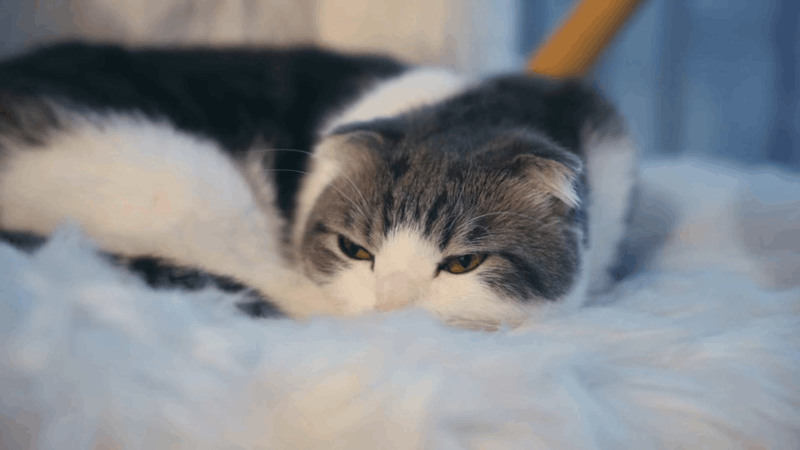
Some Effective Ways to Provide Mental and Physical Stimulation for Cats’ Sleep
For providing mental and physical stimulation for your cat:
- Interactive toys: Invest in toys that require your cat’s active participation, such as puzzle toys or treat-dispensing toys. These stimulate their mind while providing entertainment.
- Play sessions: Engage in regular play sessions with your cat using toys like wand toys, laser pointers, or feather teasers. This helps them expend energy and stimulates their hunting instincts.
- Indoor climbing options: Provide a cat tree or shelves for your cat to climb and explore. Cats enjoy vertical spaces, which can give them exercise and mental stimulation.
- Rotate toys: Introduce new toys periodically and rotate them to keep your cat’s interest and prevent boredom.
Some Techniques Can Help Relax a Cat Before Bedtime
Specific calming techniques to relax a cat before bedtime:
- Gentle grooming: Brushing your cat’s fur with a soft brush can be soothing for them and help them relax before bedtime.
- Pheromone products: Consider using synthetic pheromone diffusers or sprays that mimic the natural calming pheromones released by cats. These can create a calming environment.
- Massage: Some cats enjoy gentle massages. Start by petting them and gradually use soft, circular motions to massage their back and neck areas.
- Calming music or white noise: Play soft, soothing music or use white noise machines to create a relaxing atmosphere that can help your cat unwind.
Common Mistakes When Trying to Get a Cat to Sleep at Night
- Inconsistent routine: Cats thrive on routine, so avoid frequently changing the bedtime routine. Stick to a consistent schedule to help them understand and adapt to the sleep routine.
- Lack of stimulation: Cats need adequate mental and physical stimulation during the day. Failing to provide enough activities and playtime can lead to pent-up energy and restless nights.
- Feeding late at night: Feeding your cat a large meal right before bedtime can make them more active or cause digestive discomfort. Feed them a few hours before bedtime instead.
- Ignoring potential underlying issues: If your cat consistently struggles to sleep at night, it’s essential to rule out any underlying medical or behavioral issues. Consult with a veterinarian to address any potential problems.
The Relationship of CBD for Pain Relief and Sleep in Cats
Although there hasn’t been much research done in this area, the potential benefits of CBD for these uses are beginning to receive increasing attention. Some anecdotal reports and preliminary studies suggest that CBD may have the potential to alleviate pain and promote better sleep in cats.
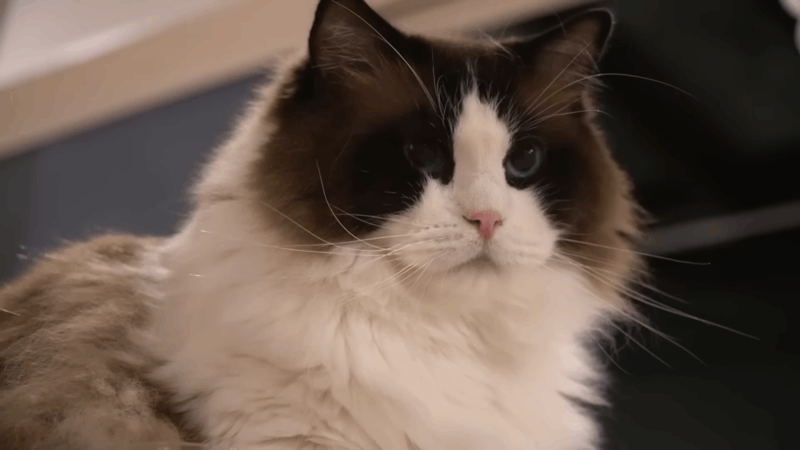
The Way CBD Help Alleviate Pain and Promote Better Sleep in Cats
CBD may potentially help alleviate pain and promote better sleep in cats through various mechanisms. Here are a few ways CBD may help:
- Pain relief: CBD interacts with the endocannabinoid system, which plays a role in pain regulation. It may help reduce pain perception by interacting with cannabinoid receptors in the body. This interaction can potentially modulate pain signaling pathways and reduce inflammation, leading to pain relief in cats.
- Anti-inflammatory effects: CBD has been studied for its anti-inflammatory properties. By reducing inflammation, it may help alleviate pain associated with conditions such as arthritis or injuries.
- Relaxation and anxiety reduction: CBD has been reported to have calming and anxiolytic (anti-anxiety) effects in some animals. By reducing anxiety and promoting relaxation, CBD may indirectly help improve sleep quality in cats. Reduced anxiety levels can lead to a more relaxed state, making it easier for cats to fall asleep and stay asleep.
- Sleep regulation: CBD’s influence on sleep in cats is not yet fully understood, but it is believed to have the potential to regulate sleep-wake cycles. It may interact with receptors and neurotransmitters involved in sleep regulation, potentially promoting better sleep quality and duration.
Tips for Choosing the Right CBD Products for Pain Relief and Sleep Support in Cats
When choosing CBD oil for cats pain relief and sleep support in cats, it’s important to consider the following factors:
- Quality and source: Opt for CBD products that are derived from high-quality, organically-grown hemp. Ensure that the product is free from pesticides, herbicides, and other harmful substances. Look for CBD brands that provide transparency regarding their sourcing and manufacturing processes.
- CBD concentration: Consider the CBD concentration in the product. Higher concentrations may be more suitable for managing severe pain or sleep issues, but it’s generally recommended to start with lower concentrations and adjust as needed. It’s best to consult with a veterinarian to determine the appropriate dosage for your cat.
- Product type: CBD products for cats come in various forms, including oils, tinctures, treats, and topicals. Choose a product type that is easy to administer and suits your cat’s preferences. CBD oils or tinctures are often recommended for their ease of use and accurate dosing.
- Third-party testing: Ensure that the CBD product undergoes third-party testing by an independent laboratory. This testing verifies the potency and purity of the product and ensures that it is free from contaminants. Look for certificates of analysis (COAs) that provide detailed information about the product’s cannabinoid profile and confirm its safety.
- Cat-specific formulations: Look for CBD products that are specifically formulated for cats. Cats have unique sensitivities and metabolisms, so it’s important to choose products that are tailored to their needs. Avoid using CBD products designed for humans or other animals, as they may contain ingredients that are harmful to cats.
Conclusion
CBD holds the potential in improving sleep and providing pain relief for cats. While research is ongoing, many cat owners have reported positive outcomes with CBD usage. CBD for sleep may help cats relax, reduce anxiety, and promote more restful sleep. It is important to choose high-quality CBD for sleep products specifically formulated for cats and consult with a veterinarian for guidance. Establishing a soothing bedtime routine, providing mental and physical stimulation during the day, and avoiding late-night feeding can also contribute to better sleep for your cat. By exploring the benefits of CBD and implementing healthy sleep practices, you can help your feline companion achieve a more peaceful and rejuvenating sleep experience.
I am Nelson Cooper, I pursue my passion for writing and my belief is that cats love humans. I enjoy traveling and have a deep appreciation for the beauty of nature, as well as a soft spot for animals, particularly cats.

